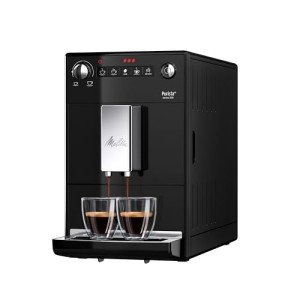Modern Espresso Machines: A Comprehensive Guide
Espresso has ended up being a cornerstone of coffee culture worldwide, fascinating enthusiasts with its abundant flavor and intense fragrance. As the demand for quality espresso rises, makers have actually developed a range of modern espresso machines created to satisfy varied choices, ability levels, and budget plans. This post aims to explore the technological advancements, features, and advantages of modern espresso machines, along with provide readers with useful insights into their usage and maintenance.
The Evolution of Espresso Machines
To completely value modern espresso machines, it is very important to understand their development. The very first espresso machine, the leaver-operated machine, was introduced in the early 20th century, followed closely by pump machines in the 1960s. These developments helped with higher pressure control, eventually causing a better extraction procedure.
Today, the landscape of espresso machines consists of several types:
| Machine Type | Description | Target market |
|---|---|---|
| Manual | Requires skill for brewing, lever-operated to manage pressure | Coffee perfectionists, experts |
| Semi-Automatic | Automation of water shipment; user manages grind and tamp | Home brewers, baristas |
| Automatic | Immediately controls brewing time; requires minimal input | Casual drinkers |
| Super-Automatic | One-touch operation with integrated mills | Convenience seekers |
| Pill | Uses coffee pods for ease of use and clean-up | Casual users |
Secret Features of Modern Espresso Machines
Modern espresso machines come geared up with a series of functions that accommodate numerous user needs and choices. Here's a more detailed look:
- Pressure Control: The ability to manage the pressure during extraction is essential for achieving the ideal espresso shot. Numerous modern machines included adjustable pressure settings, allowing users to experiment.
- Temperature level Stability: Consistent water temperature is necessary for optimal extraction. Machines with dual boilers or PID controllers keep stable brewing temperatures.
- Integrated Grinders: Super-automatic machines usually include built-in grinders that enable users to grind fresh coffee beans right before brewing.
- User Interfaces: Touchscreen shows and programmable settings enhance user experience by offering customizable developing alternatives.
- Milk Frothing Systems: Integrated steam wands or automatic frothers make it much easier to prepare lattes and cappuccinos.
- Self-Cleaning Functions: Many modern machines have self-cleaning alternatives that simplify maintenance and extend the machine's life-span.
Picking the Right Espresso Machine
When choosing a modern espresso machine, numerous factors must be thought about, including budget, experience level, and preferred performances. Here is a list of factors to consider:
Tips for Selecting an Espresso Machine:
Determine Your Skill Level:
- Beginners may choose super-automatic machines.
- Advanced users may enjoy manual or semi-automatic options.
Assess Your Budget:
- Espresso machines range from under ₤ 100 to several thousand dollars. Ensure that your option lines up with your monetary strategy.
Assess Feature Preferences:
- Decide whether you require features like a built-in grinder, advanced temperature control, or enhanced milk frothing abilities.
Think about Space:
- Measure your cooking area area, as some espresso machines can be rather big.
Read Reviews:
- User reviews can offer insight into the machine's dependability and performance.
Upkeep of Modern Espresso Machines
Proper maintenance is necessary for guaranteeing the durability and ideal efficiency of an espresso machine. Here are some maintenance suggestions:
Regular Maintenance Checklist:
Daily:
- Clean the coffee premises from the portafilter.
- Wash the water tank and fill it with fresh water.
- Clean the steam wand after each use.
Weekly:
- Run a clean cycle with a descaling service.
- Tidy the drip tray and any detachable parts.
Month-to-month:
- Check and replace water filters as needed.
- Deep tidy the machine's internal components according to the manufacturer's directions.
Frequently Asked Questions About Modern Espresso Machines
1. What type of espresso machine is best for newbies?
A super-automatic machine is ideal for newbies due to its simplicity. Matte Espresso Machines automates the entire process, from grinding to brewing, making it easy to use.
2. How do I understand if my espresso machine requires descaling?
If you see a decrease in pressure, sluggish developing times, or mineral buildup around the machine's components, it might be time to descale.
3. Can I use regular coffee grounds in an espresso machine?
No, espresso machines require finely ground coffee to create the appropriate pressure for extraction. Regular coffee grounds are too coarsely ground and will not produce the desired outcomes.
4. Are more pricey espresso machines worth the financial investment?
Higher-priced designs typically offer more functions, better develop quality, and enhanced longevity. However, the very best choice depends on specific preferences and how often you prepare to use it.
5. How typically should I clean my espresso machine?
Daily cleaning of the portafilter and steam wand is advised. A complete cleaning routine must be performed weekly or regular monthly, depending upon use.
The world of modern espresso machines is varied and constantly progressing, dealing with a large range of coffee enthusiasts-- from casual drinkers to experienced baristas. Understanding the functions, types, and correct maintenance of these machines is vital for making an informed purchase. Whether one looks for the convenience of a super-automatic machine or the hands-on experience of a manual one, there is an espresso machine readily available to satisfy the yearning for that ideal cup of espresso.

